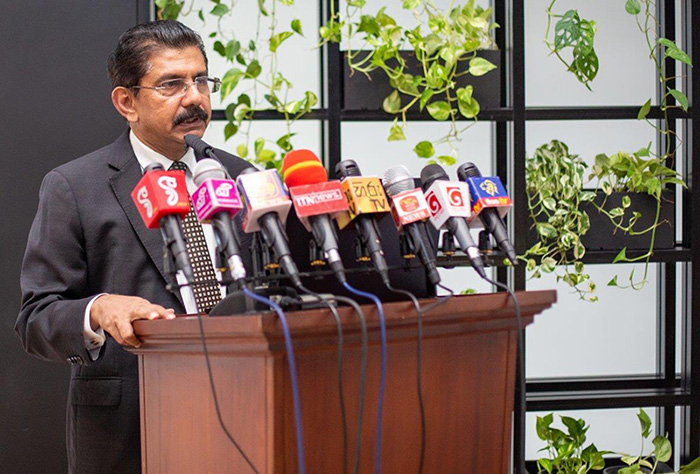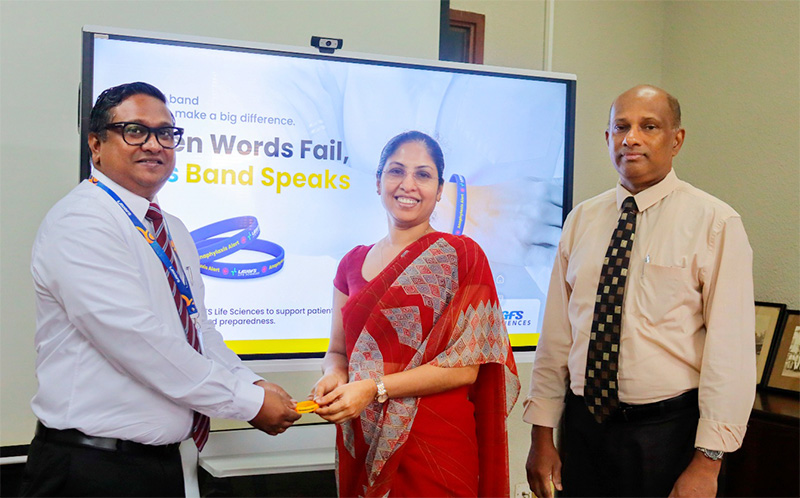Business
Economic benefits of early detection and treatment of cervical cancer

By Ifham Nizam
Cervical cancer is a major public health issue in Sri Lanka, ranking as the fifth most common cancer among women. However, its economic impact goes beyond the lives it claims. Preventing and treating cervical cancer presents both a health and economic opportunity, especially as Sri Lanka strives to meet the World Health Organization’s (WHO) 90-70-90 targets by 2030.
The cost of cervical cancer treatment, as well as the loss of productivity from affected women, is a significant financial burden on the country. In 2021 alone, Sri Lanka recorded 1,238 new cases, accounting for 6% of all cancer diagnoses in women.
The disease is primarily caused by the Human Papillomavirus (HPV), the economic logic behind prevention becomes clear. Early detection and vaccination offer highly cost-effective strategies that could prevent much of this burden, saving lives and, ultimately, money.
To address this issue, Sri Lanka has witnessed an unprecedented collaboration between public and private sectors, driven by key players such as Dilmah’s MJF Charitable Foundation, the Health Ministry and the Rotary Club of Colombo. Together, they are pushing forward initiatives to provide affordable access to HPV DNA testing kits, a crucial tool for screening and early detection. These kits are far more accurate and efficient than traditional pap smears, making them a better investment for long-term cancer prevention.
The commitment behind this initiative is significant. In January 2024, Dilmah pledged Rs. 75 million, the government of Sri Lanka committed Rs. 35 million annually and Rotary contributed Rs. 26 million to fund HPV DNA testing. This type of public-private partnership has the potential to become a model for other sectors in Sri Lanka.
Addressing these challenges could be the key to unlocking economic benefits. As Dr. Anil Jasinghe, Health Ministry Secretary, highlighted at a recent awareness event, Sri Lanka’s success in screening and early detection could make a profound economic difference. Screening helps to identify precancerous conditions before they evolve into full-blown cancer, drastically reducing treatment costs and improving survival rates.
Yet, one of the major barriers to screening is the stigma surrounding the disease. Education and awareness campaigns, often spearheaded by the MJF Foundation and the Rotary Club, are essential to overcoming this obstacle. These public campaigns aim to normalize cervical cancer screening and encourage take proactive steps toward their health. As more women participate in screenings, the benefits to the national economy will increase, not only in terms of saved medical expenses but also through the enhanced economic contributions of healthier women.
Business
Norochocholai coal-fired power complex seen as facing staggering financial losses

Sri Lanka’s first and largest coal-fired power complex at Norochcholai is staring at mounting financial losses running into millions of rupees as low-quality coal imports, rejected shipments and unusable stockpiles disrupt operations and expose deep flaws in coal procurement, power sector and environmental experts warned yesterday.
Energy sector sources told The Island Financial Review the economic damage has already begun, with rejected coal stocks, delayed payments and declining plant efficiency forcing the system to absorb losses from under-performance, additional handling costs and the risk of turning to more expensive backup generation.
Insiders estimate that continued reliance on sub-standard coal could result in tens of millions of rupees in losses per day, once reduced output, higher fuel burn and maintenance costs are factored in.
At the centre of the controversy is a recent coal shipment procured by the Lanka Coal Company (LCC), which has come under intense scrutiny after laboratory tests reportedly showed ash content of around 21%, far exceeding the 16% maximum allowed under tender conditions.
While parliamentary debate has focused narrowly on whether the coal meets the required calorific value, experts stress that excessive ash alone is sufficient grounds for outright rejection, regardless of calorific performance.
The situation worsened after coal stocks at the Norochcholai Coal-Fired Power Complex were recently rejected, leaving shipments in limbo and payments withheld. Power sector officials say this has resulted in logistical losses, demurrage risks and operational uncertainty, while existing low-quality coal stockpiles continue to deteriorate in storage.
“Coal that does not meet specifications is not just unusable — it becomes a financial liability, a senior electrical engineer said.
High-ash coal reduces boiler efficiency, increases fly ash generation and accelerates wear on ash handling systems, electrostatic precipitators and boilers — translating into higher maintenance costs and forced outages. Industry analysts warn that these hidden costs ultimately find their way into CEB losses or consumer tariffs.
Environmental Scientist Hemantha Withanage warned that accepting or burning such coal would push Norochcholai into a new environmental crisis, with serious consequences for communities in Norochcholai, Puttalam and surrounding areas.
“This is not just about calorific value. High ash coal means significantly more fly ash, Withanage told The Island Financial Review. “With low moisture and excessive ash, particulate matter spreads easily, contaminating air, soil and water. This is a massive ecological threat that will directly affect public health.”
He stressed that fly ash contains toxic heavy metals and fine particulates linked to respiratory illness and long-term environmental degradation. “If tender conditions are ignored, the cost will be paid by communities, not the suppliers, Withanage said.
Critics say the crisis exposes serious weaknesses in coal procurement oversight, with questions now being raised about supplier selection, quality verification and accountability. They argue that repeatedly importing low-quality coal — only to reject it or burn it at reduced efficiency — amounts to systemic mismanagement of public funds.
By Ifham Nizam
Business
IRCSL launches ambitious mission to transform Sri Lanka’s insurance sector

In a groundbreaking initiative, Insurance Regulatory Commission of Sri Lanka (IRCSL), announced an ambitious mission aimed at transforming the insurance industry into a cornerstone of national economic resilience and social stability.
To address this, the IRCSL will launch a nationwide education campaign titled “Insurance for All: For a Secure Future,” focusing on enhancing financial literacy across the country said Dr. Ajith Raveendra De Mel, the newly appointed Chairman IRCSL. Few sample events have already commenced last year in Matara, Jaffna and Kilinochchi that have set a strong precedent for future initiatives. “The positive response from participants highlighted the strong need for direct engagement and community-level awareness,” he said.
The IRCSL has also partnered with the Ministry of Education to integrate insurance literacy into the national curriculum, starting as early as Grade 5. This initiative aims to embed core concepts of risk management and financial protection, preparing students for future roles in the insurance industry. Complementing educational efforts, the IRCSL is also hosting an Inter-University Quiz Competition focused on insurance and financial literacy, aiming to engage university students and cultivate future thought leaders in the sector. Additionally, an e-Newsletter will keep stakeholders informed about industry updates and regulatory developments.
Dr. De Mel emphasized that this transformation it is not just about increasing insurance penetration, currently at a mere 1.1%, but about fostering a financially literate society where every citizen, family, and business is shielded from unforeseen risks. He said “Our mission is to cultivate a fully insured, financially literate, and future-ready society. The journey ahead involves profound regulatory, technological, and educational reform to create a modern, transparent, and robust regulatory environment that earns public trust while promoting innovation and sustainable growth in the industry.”
He pointed out the critical need for awareness, noting that many Sri Lankans perceive insurance as complex or exclusive to the wealthy. “We need to change how people think about insurance. Our goal is to make it simple, relatable, and accessible to everyone, particularly in rural and underserved communities,” he explained. The IRCSL will collaborate closely with the Insurance Association of Sri Lanka (IASL), the Sri Lanka Insurance Brokers Association (SLIBA), and the Sri Lanka Insurance Institute (SLII) to ensure that the message of financial preparedness reaches all corners of the nation. As Sri Lanka stands on the brink of an insurance transformation, Dr. De Mel’s vision promises a secure future driven by informed financial decisions and enhanced protection against life’s uncertainties.
The IRCSL is also focusing on digital transformation, enhancing operational excellence within the insurance sector. Key initiatives include establishing a Centralized Motor Insurance Database to improve transparency and efficiency in motor insurance, and advancing health insurance through digital integration, including standardized disease coding and electronic health records.
To ensure global competitiveness, the IRCSL is benchmarking against international best practices. A recent study tour to India has provided valuable insights into implementing risk-based supervision and capital frameworks, as well as developing accessible insurance products for underserved communities.
As the IRCSL approaches its 25th anniversary, it emphasizes the importance of staff development and alignment with other financial regulatory bodies to maintain high professional standards. The upcoming OECD/ADBI Roundtable on Insurance and Retirement Savings in Asia will further position Sri Lanka as a leader in insurance discussions, fostering regional collaboration and innovation.
by Claude Gunasekera
Business
Sri Lanka’s first public allergy awareness wristbands

LAUGFS Life Sciences, in collaboration with the Medical Research Institute (MRI), Colombo, has launched Sri Lanka’s first-ever publicly driven allergy awareness wristbands, a groundbreaking initiative aimed at improving patient safety and preparedness in medical emergencies. The wristbands provide essential information about drug sensitivities, allowing healthcare professionals to respond quickly and effectively when time is critical.
The official handover ceremony featured distinguished medical experts, including Dr. Dhanushka Dassanayake, Consultant Immunologist and Head of the Department of Immunology – MRI, Dr. Rajiva De Silva, Senior Consultant Immunologist – MRI and Dr. Prabath Amerasinghe, Deputy Director – MRI, marking a historic milestone in patient care in the country.
Commenting on the initiative, Dr. Rajiv Perera, CEO of LAUGFS Life Sciences, said, we are proud to partner with the Medical Research Institute to launch Sri Lanka’s first-ever publicly driven allergy awareness wristbands. This initiative underscores our commitment to patient-centric healthcare by providing critical information that can save lives during emergencies. We believe that thoughtful collaborations like this can have a meaningful impact on patient safety, and we look forward to expanding the program to cover additional drugs and allergens, further advancing healthcare standards across the country.
-

 News3 days ago
News3 days agoSajith: Ashoka Chakra replaces Dharmachakra in Buddhism textbook
-

 Business3 days ago
Business3 days agoDialog and UnionPay International Join Forces to Elevate Sri Lanka’s Digital Payment Landscape
-

 Features3 days ago
Features3 days agoThe Paradox of Trump Power: Contested Authoritarian at Home, Uncontested Bully Abroad
-

 Features3 days ago
Features3 days agoSubject:Whatever happened to (my) three million dollars?
-

 News2 days ago
News2 days agoLevel I landslide early warnings issued to the Districts of Badulla, Kandy, Matale and Nuwara-Eliya extended
-

 News2 days ago
News2 days agoNational Communication Programme for Child Health Promotion (SBCC) has been launched. – PM
-

 News3 days ago
News3 days ago65 withdrawn cases re-filed by Govt, PM tells Parliament
-

 Opinion5 days ago
Opinion5 days agoThe minstrel monk and Rafiki, the old mandrill in The Lion King – II










